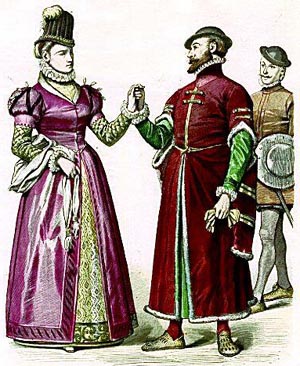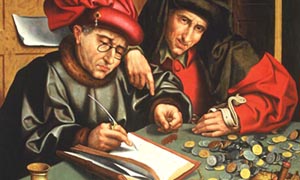 |
Organic Society
A Missing Bourgeois Elite
Plinio Corrêa de Oliveira
Continuity can give the bourgeoisie a kind of noble patina, a patina that can only be acquired if it comes from a long past. After four, five or eight generations of dignified merchants or industrial producers who continuously aim to improve the quality of their products - the Kummel or Gin, for example, they reach the quintessence of their genres.
This search for quality, and not for quantity or mere profit, is inspired by a love for a certain metaphysical value that ends by being a reflection of God, who is noble par excellence.

English bourgeois - The quest for perfection should inspire the progress of their class |
This search for a metaphysical value is what permits one to say that a member of the old bourgeoisie, swathed in qualities that lean toward nobility, can be a dignified member of the noblesse de robe. Because what he seeks is more than a merely lucrative pursuit turned toward his personal interest; rather, he is looking for something like an ideal, which is essential to the concept of nobility.
A fact not to be forgotten is that in a Catholic society, each one is (or should be) motivated by a continuous desire to improve his own class. I am not talking about changing one’s social level, but rather perfecting and raising oneself within his level. When each one has this desire for perfection, the ensemble of society rises. This prevents stagnation, like what happened in the caste system of the early Chinese Empire.
This improvement should not only aim for gaining more comfort and utility, but also for raising the level and category of life.
Take, for example, a merchant in the Middle Ages and compare him with a merchant at the end of the Ancien Regime. The medieval merchant was much closer to the man who carried sacks on his back and worked with his hands than his counterpart in the Ancien Regime. This difference illustrates a process wherein the medieval merchant made an effort to form and polish himself, to find good schools for his children, and so on. Gradually he improved and raised himself, as did his entire class. The quality of the life of the merchant at the end of the Ancien Regime was much better than that of his forefather in the Middle Ages, providing evidence that the whole class progressed.
Thus, in a Catholic society it is not only the upper level of society, the nobility, that rises while all the other strata become stagnant, but it is the whole social body that elevates itself in a continuous line of progress.
A still unresolved social problem
A revolutionary development of the bourgeoisie was to focus this tendency to perfection not on developing and improving its own class, but to jump out of it to enter the nobility. Thus, the wealthy merchants began to try to imitate the nobles.

Jacques Coeur used his wealth to marry his family with nobles & become a King's counselor |
They enrolled their daughters in the schools of the nobles so that they would begin to socialize with them. Shortly, their daughters would be visiting at the homes of their friends who were nobles and entering their circles. Before long, a merchant’s daughter would marry some young man from an impoverished noble house that needed money to restore its noble standards and shimmer. From the moment she married a noble young man, the merchant’s daughter would be assimilated into the nobility and would begin to deal with all the nobles as an equal.
Historically this is what happened. As a consequence, the wall of separation between the nobility and the bourgeoisie became increasingly tenuous and ready to fall.
How can this revolutionary jump of classes be prevented without impairing the normal vitality of the bourgeoisie? How can a noble that loses his means be assisted so that he does not have to resort to unsuitable marriages to resolve his financial needs? These are problems that still need to be resolved.
The solution for these problems is not to be found in an artificial planning committee of experts sitting around a table. I believe that Catholic customs are more likely to provide a solution for them.
Missing organic bourgeois elite
In a society where economic growth is gradual, there is normally economic stability in its families, acquired through many generations and generating a number of traditions. When this occurs organically, an original elite rises up. It is not the same as the elite that sheds its blood for the defense of the common good, like the nobility; nonetheless, it is an authentic elite.
How would such an elite based on a longstanding financial stability have been if it had been Catholic? I cannot give an answer to that question. What I can say is how it should not have been. It should not have tried to imitate the nobility, but should have arranged a way to foster its own perfection – a lesser perfection than that of the nobility, but still a real perfection.
After a period of developing this good tendency, the bourgeoisie would have generated its own monetary elite, which would not be the same as the aristocratic nobility. It would be something different, a new creation that had not previously existed.

The monetary elite has to develop Catholic perfection to not be a cancer in society |
Let me point out that I am not speaking here about the noblesse de robe, which was a part of the bourgeoisie turned toward teaching and making laws; after some generations of holding positions as city magistrates or university deans, such families became a minor nobility. These bourgeois were not particularly wealthy. Nor am I speaking here of the mercantile aristocracy of Venice.
I am considering the monetary and financial elite which of itself never acquired any title of nobility but only tried to infiltrate the authentic nobility by marrying their daughters to impoverished young nobles. Or they would lend money to sovereigns and “ask” in return to be made nobles. These are the bourgeois to whom I am referring: the very wealthy merchants controlling large amounts of money. They could have formed an elite that would have dealt with finances in a Catholic way and would have prevented the emergence of the revolutionary false elite that acquired increasing control over money after the Middle Ages.
What kind of elite would they form if they were Catholic? What should be their relations with the authentic nobility of blood? How should they submit to the Church in order not to become the cancer they became in society? These questions still need to be answered.
Among the organic elites, therefore, an empty space exists. We cannot invent something to fill it. We have to wait for a new Catholic era that will inspire the bourgeois to develop it organically.

Posted July 18, 2012

  | | Prof. Plinio |
Organic Society was a theme dear to the late Prof. Plinio Corrêa de Oliveira. He addressed this topic on countless occasions during his life - at times in lectures for the formation of his disciples, at times in meetings with friends who gathered to study the social aspects and history of Christendom, at times just in passing.
Atila S. Guimarães selected excerpts of these lectures and conversations from the transcripts of tapes and his own personal notes. He translated and adapted them into articles for the TIA website. In these texts fidelity to the original ideas and words is kept as much as possible.

Related Topics of Interest
 The Healthy Rise of the Bourgeoisie The Healthy Rise of the Bourgeoisie
 An Élan for Perfection Should Exist in All Classes An Élan for Perfection Should Exist in All Classes
 The Bourgeois in Free Cities and Kingdoms The Bourgeois in Free Cities and Kingdoms
 Two Opposed Poles of Society: Prestige and Money Two Opposed Poles of Society: Prestige and Money
 Economy's Role in the Collapse of the Medieval Mentality Economy's Role in the Collapse of the Medieval Mentality
 Respectability in the Medieval Professions Respectability in the Medieval Professions
 Different Types of Nobility Different Types of Nobility
 The Peasant-Nobles of the Roncal Valley The Peasant-Nobles of the Roncal Valley

Related Works of Interest
|
|
Organic Society | Social-Political | Home | Books | CDs | Search | Contact Us | Donate

© 2002-
Tradition in Action, Inc. All Rights Reserved
|
 |
|